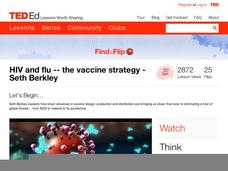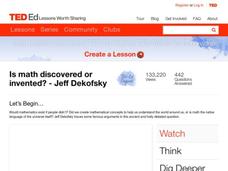TED-Ed
How the Bendy Straw Was Invented
Sitting in a soda parlor, Joseph Freedman notices the difficulty his young daughter has trying to drink from the paper straw in her milkshake. This sparks the invention of a bendy straw. Watch to learn more about this small but widely...
TED-Ed
HIV and Flu -- The Vaccine Strategy
What is the biggest threat to a mass number of humans? Not natural disasters, but rather, pandemics! With a lecture and slide show, the speaker discusses how medical technology in the form of vaccines is bringing an end to suffering and...
TED-Ed
Why It Pays to Work Hard
Hard work is the second of Richard St. John's "8 Traits Successful People Have in Common." Many young learners believe that in order to be successful, one needs to have a great deal of talent or intelligence; however, after interviewing...
Brightstorm
Linear Inequalities - Concept
Not all inequalities are equal. A video provides an introduction to the notation for inequalities. It provides tips on connecting the notation to the way the inequality is graphed, either on a number line or the coordinate plane.
DoodleScience
The Energy Types
How many types of energy can you name? A video introduces all 10 types of energy and gives a brief explanation of each.
Crash Course
Deficits and Debts
Should the escalating national debt be keeping you up at night with worry? Not necessarily, as explained by an entertaining video by Crash Course economics. Learn about the ways that a high GDP can contribute to the health of an economy...
Crash Course
Programming Basics—Statements and Functions: Crash Course Computer Science #12
Include an informative video on programming as part of your computer science instruction. The 12th installment in the series teaches about statements and functions required to write code. Individuals learn about the IF, FOR, and WHILE...
American Chemical Society
How to Make Flowers Last Longer
"Nature's first green is gold, Her hardest hue to hold. Her early leaf's a flower; But only so an hour." - Robert Frost. An engaging video in the ACS Reactions playlist explains six steps that people can take to make flowers last longer....
Crash Course
Robots: Crash Course Computer Science #37
Without computer science, robots would just be scrap metal. Individuals watch an informative video to learn about robots. The video covers a brief history of robots and identifies current advances in robotics. This is the 37th video in...
PBS
Global Precipitation
A lack of rain created deserts on one-third of the earth's land surface, while excess rain created rain forests on only six percent. Scholars observe a global perspective of rain fall. They see the satellite imagery over a six-month...
GCFGlobal.org
Avoiding Plagiarism
How can learners avoid plagiarism in their academic work? Pupils learn some helpful strategies with the first of four videos from the Use Information Correctly series. Scholars discover the importance of citing sources and learn how to...
Crash Course
Cats Vs Dogs? Let's Make an AI to Settle This: Crash Course AI #19
Would you let artificial intelligence make important decisions for you? The 19th installment of the Crash Course Artificial Intelligence unit shows viewers how to use artificial intelligence to help in decision-making. They see how to...
Khan Academy
Compare the Hair Dryer Motor to the One You Can Build
Could you build a motor for a hair dryer? Viewers of a short video watch as the narrator compares a hair dryer motor to an electric motor built from a kit. Each component of the hair dryer motor correlates to a component in the electric...
Curated OER
Carbon Dating - How Does It Work?
For the first two minutes of this video, space-age narration and computer animation illuminate the science behind carbon dating. The presentation then switches gears and uses simple graphics and another narrator to explain the same...
Lifehacker
Programming! Learn the Basics of Coding, How to Pick a Language a Project, and More!
Kick off an introductory computer science course with this exploration of computer programming basics. From variable types and writing statements in JavaScript to finding a web host and deploying a website, this resource provides...
TED-Ed
Debunking the Myths of OCD
Discover the distinction between OCD tendencies and the neurological disorder itself, as well as clues as to the causes of OCD, how people with OCD perceive their actions and anxieties, and finally how to treat the disorder.
Code.org
How Computers Work: What Makes a Computer, a Computer?
You see computers all the time, but do you really know how a computer works? The first installment of a five-part playlist explains the essential functions of a computer. The video describes, in detail, each of the functions: input,...
TED-Ed
How Does Caffeine Keep Us Awake?
You might want to put down your coffee for this one. Discover the science behind this stimulant, its origins, side-effects, and benefits of the most widely used drug: caffeine.
Code.org
How Computers Work: Binary and Data
There are two types of people in the world: those who understand binary and those who do not. Pupils watch a video that describes how computers store information using binary code. They learn how programmers can encode text, images, and...
Code.org
The Internet: Packets, Routing and Reliability
Viewers of this video learn about how computers send and receive information through the Internet. It describes how the Internet splits information into packets and sends it over different routes.
TED-Ed
The Artists | Think Like A Coder, Ep 5
Create a diversion! Continuing the quest to save the world, the hero of the series needs to find an artifact inside a tower. To distract the guards, she programs a robot to vandalize some artwork. Viewers learn how to apply loops and...
TED-Ed
How to Understand Power
Where does power come from, and why does it matter? This video will spark engaged thought and conversation amongst your class as it discusses the origins of power, how it's exercised, and what young learners can do to become powerful in...
TED-Ed
Is Math Discovered or Invented?
Did mankind invent mathematical concepts, or is math the native language of the universe itself? Discover the beliefs of famous philosophers such as Plato and Euclid with regard to the place of numbers in nature, and take a brief look at...
TED-Ed
Is It Bad to Hold Your Pee?
How many times should a person pee a day? Is it a bad habit to hold it? What makes us have to go pee? These questions are answered in an informative video about the urinary system, and the importance of urinating at the first sign of...
Other popular searches
- Graphic Design Lessons
- Graphic Design Principles
- Graphic Design Packaging
- Teaching Graphic Design
- Graphic Design Typography
- Graphic Design Logo
- Graphic Design Posters
- Art Graphic Design
- Graphic Design Art Lessons
- Graphic Design Jobs
- Graphic Design Movie Poster
- Graphic Design Cd Covers

























